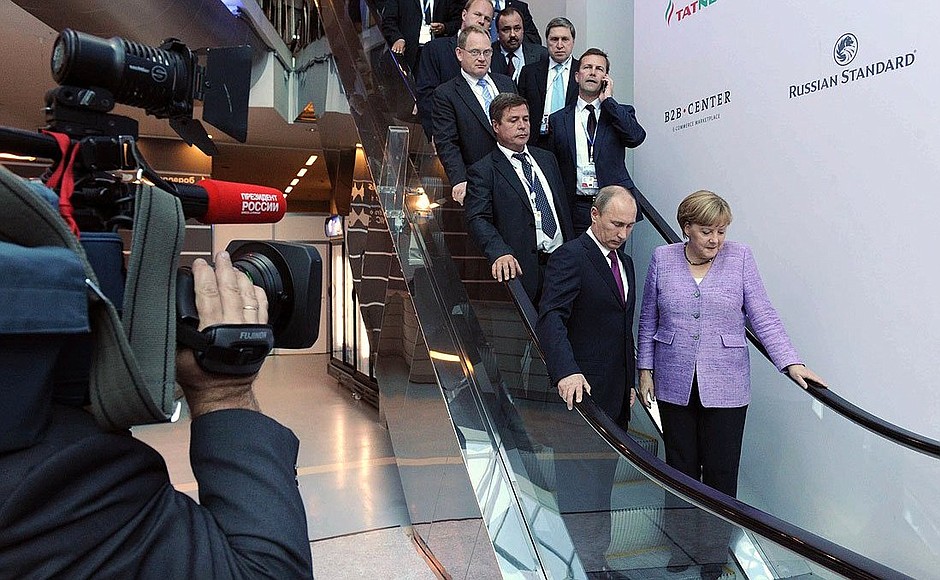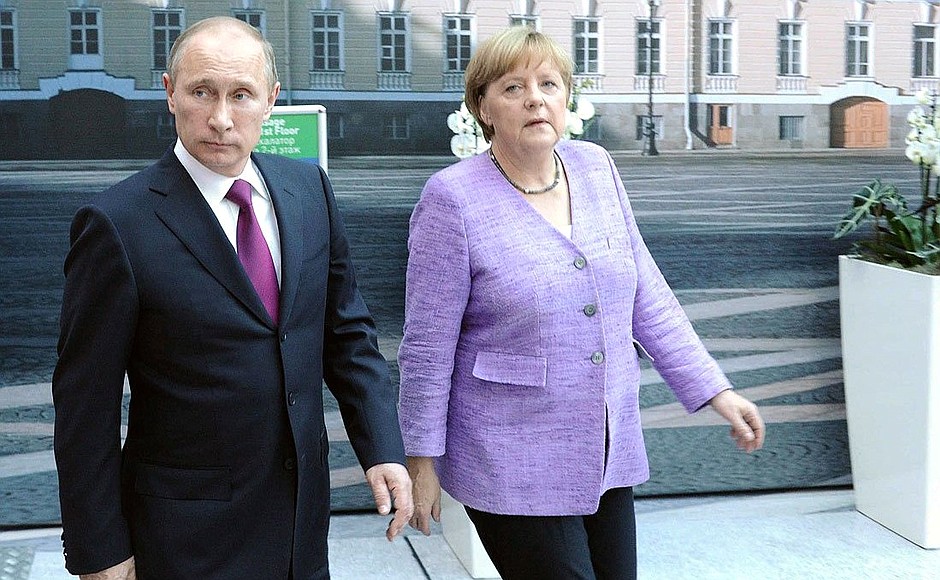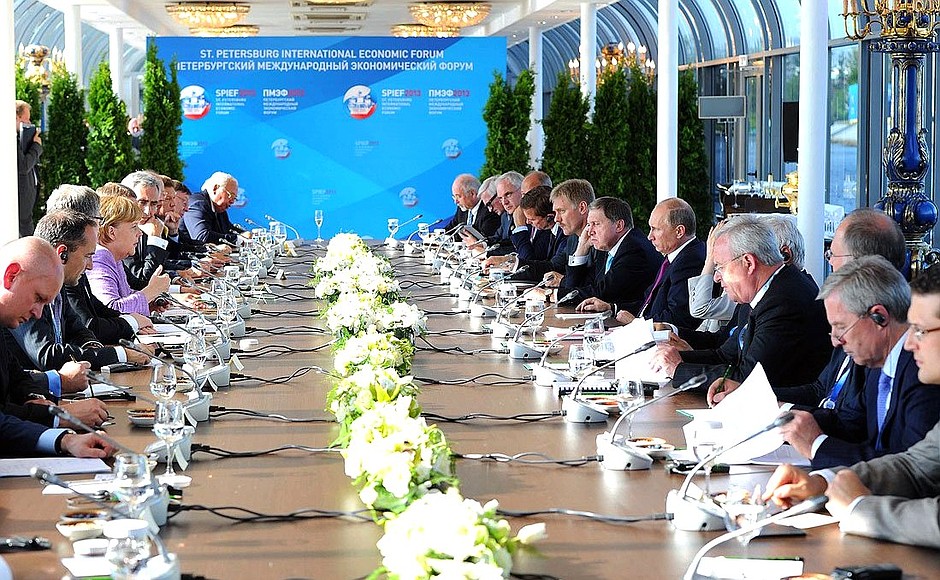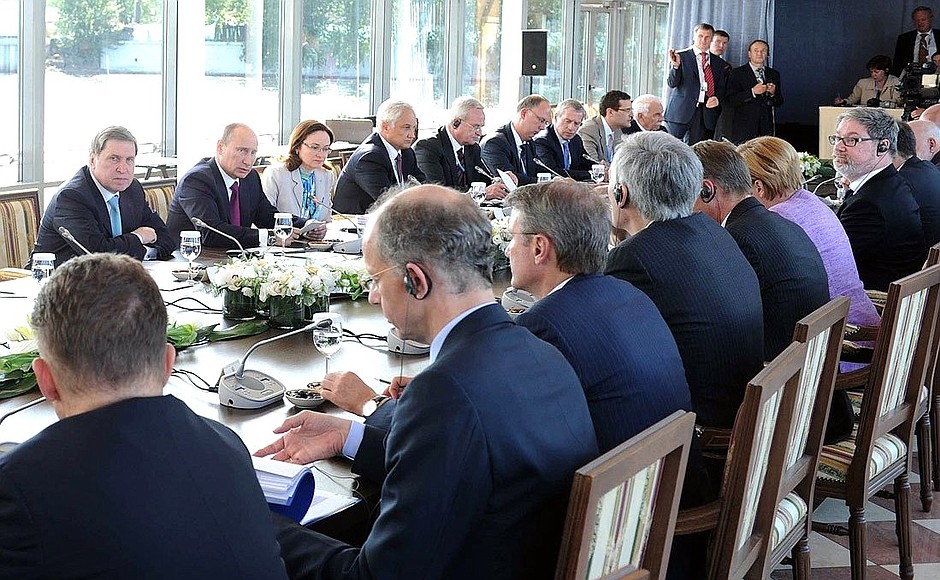In particular, the President of Russia and the Chancellor of Germany invited members of the Russian and German business elite to express their views about the possibility of further broadening economic cooperation.
Participants in the meeting included the heads of several Russian companies working in the German market and heads of major German enterprises.
* * *
Opening remarks at meeting with members of Russian and German business communities
President of Russia Vladimir Putin: Our meeting with business representatives, which has by now become a tradition, is being held this time within the framework of the St Petersburg International Economic Forum which is a platform to discuss the most pressing problems in developing global trade. It is important that these discussions are being held with participation by Russian and foreign business communities.
I am especially pleased to have this particular group of people gathered today. It was made possible by Ms Federal Chancellor, because she agreed to come to St Petersburg for this forum, in spite of her tight schedule, with domestic policy matters becoming more intense due to the upcoming elections. But it’s nice that regardless of the situation the government of Germany is nevertheless giving due attention to the routine but highly important efforts of facilitating cooperation between the economies of such countries as Russia and Germany.
We opened the forum’s plenary session together and then engaged in substantive talks in a bilateral format.
”Germany is among our three largest economic partners. Over six thousand companies with German capital are operating in Russia. Large-scale bilateral projects are being successfully implemented in energy, shipbuilding, and sectors such as machine tool manufacturing, pharmaceuticals and other areas.“
I would like to note the following with regard to our cooperation. Overall, we have already spoken about this to the media, as well as at the forum itself, but I will repeat a few points nevertheless. Germany is among our three largest economic partners, and in 2012, we reached new heights, according to various estimates, of approximately 80 billion dollars. Last year, trade grew by 2.9 percent. Even though it did drop somewhat in the first quarter of this year and growth rates have decreased, I hope we will recover all this.
No doubt, we can cross an even more serious threshold: namely, 100 billion dollars in trade. So, just as always, this will require the input of business communities, the launch of new projects in our traditional areas of cooperation, as well as in manufacturing, the innovative sector and so on.
We have all the necessary prerequisites for that. In recent years, the Russian economy has undergone significant structural changes. We do understand they are still not sufficient, but nevertheless, we are emphatically moving in that direction.
Last year, Russia’s GDP growth was 3.4 percent, unemployment was at a historically low rate of 5.5 to 5.6 percent, the public debt was moderate at 2.3 to 2.5 percent [of GDP], and taken together with domestic debt, it stood at 10 to 11 percent.
The consistently high level of our [currency] reserves is growing further, thanks to the so-called budget rule, i.e., the contribution of all our oil and gas income after a certain threshold to reserve funds. The National Welfare Fund is nearing somewhere around 87 to 89 billion dollars. Another reserve fund – called the Government Reserve Fund – is at around 85 billion dollars. And the Central Bank’s gold and foreign currency reserves are worth 516 billion dollars.
We are consistently lowering the administrative burden on our entrepreneurs. Russian taxes are among the lowest in the world. According to the World Bank rating, in 2012, Russia rose by 8 points in terms of favourable business conditions.
Russia is actively modernising manufacturing facilities, implementing the newest technologies in the industries. We modernised the auto industry and are working on long-term programmes for developing medicine, pharmaceuticals, air and space and aircraft engineering.
”Russia is open to joint initiatives in modernising infrastructure. We are interested in getting German companies involved in upgrading facilities in transport and telecommunications systems.“
German companies are actively involved in these efforts supplying capital and technologies. German entrepreneurs – in other words, you, my most respected colleagues – have long and steadfastly been established in the Russian market. The total volume of aggregate German investments in 2012 was 25 billion dollars. Over six thousand companies with German capital are operating in Russia.
Large-scale bilateral projects are being successfully implemented in energy, shipbuilding, and sectors such as machine tool manufacturing, pharmaceuticals and other areas.
It is important for large companies as well as midsize and small businesses to get involved in implementing all these programmes. For our part, we are prepared to provide various forms of support, which I am confident will be effective.
Russia is open to joint initiatives in modernising infrastructure. We are interested in getting German companies involved in upgrading facilities in transport and telecommunications systems.
We could discuss all these new projects, initiatives and ideas in more detail today, in a relaxed atmosphere on the Neva river, taking our time.
You are quite familiar with Russia’s business environment, its difficulties and problems. Unfortunately, we still have quite a few such problems. It would be particularly valuable to hear your assessments so that we can find our bearings and prevent various threats before they appear.
I am confident that with our joint efforts, we will be able to create even more favourable conditions for the stable development of our national economies, improving our peoples’ living standards, and I very much hope our dialogue today will be open, substantive and engaged.
Thank you very much for your attention.



